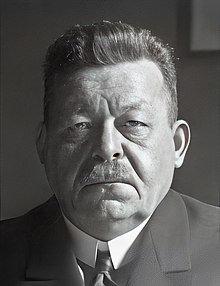Friedrich Ebert
| Friedrich Ebert | |
|---|---|
 |
|
| President of the German Reich | |
|
In office 11 February 1919 – 28 February 1925 |
|
| Chancellor |
Philipp Scheidemann Gustav Bauer Hermann Müller Konstantin Fehrenbach Joseph Wirth Wilhelm Cuno Gustav Stresemann Wilhelm Marx Hans Luther |
| Preceded by | Position established |
| Succeeded by | Paul von Hindenburg |
| Chancellor of Germany | |
|
In office 9 November 1918 – 11 February 1919 |
|
| Preceded by | Maximilian von Baden |
| Succeeded by | Philipp Scheidemann |
| Prime Minister of Prussia | |
|
In office 9 November 1918 – 11 November 1918 |
|
| Preceded by | Maximilian von Baden |
| Succeeded by | Paul Hirsch |
| Personal details | |
| Born | 4 February 1871 Heidelberg, Baden, German Empire |
| Died | 28 February 1925 (aged 54) Berlin, Germany |
| Political party | Social Democratic Party of Germany |
| Spouse(s) | Louise Ebert |
| Children |
Friedrich (1894–1979) |
| Religion | lapsed Roman Catholic |
| Signature |  |
Friedrich (1894–1979)
Georg (1896–1917)
Heinrich (1897–1917)
Karl (1899–1975)
Friedrich Ebert (/ˈiːbərt/; 4 February 1871 – 28 February 1925) was a German politician of the Social Democratic Party of Germany (SPD) and the first President of Germany from 1919 until his death in office in 1925.
Ebert was elected leader of the SPD on the death in 1913 of August Bebel. In 1914, shortly after he assumed leadership, the party became deeply divided over Ebert's support of war loans to finance the German war effort in World War I. A moderate social democrat, Ebert was in favour of the Burgfrieden, a political policy that sought to suppress squabbles over domestic issues among political parties during wartime in order to concentrate all forces in society on the successful conclusion of the war effort. He tried to isolate those in the party opposed to the war, but could not prevent a split.
Ebert was a pivotal figure in the German Revolution of 1918–19. When Germany became a republic at the end of World War I, he became its first chancellor. His policies at that time were primarily aimed at restoring peace and order in Germany and containing the more extreme elements of the revolutionary left. In order to accomplish these goals, he allied himself with conservative and nationalistic political forces, in particular the leadership of the military under General Wilhelm Groener and the right wing Freikorps. With their help, Ebert's government crushed a number of leftist uprisings that were ironically pursuing goals similar to those of the SPD. This has made him a controversial historical figure.
...
Wikipedia
